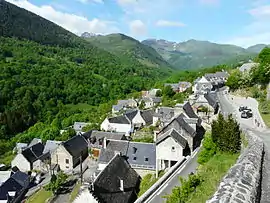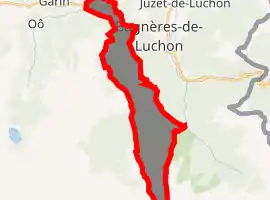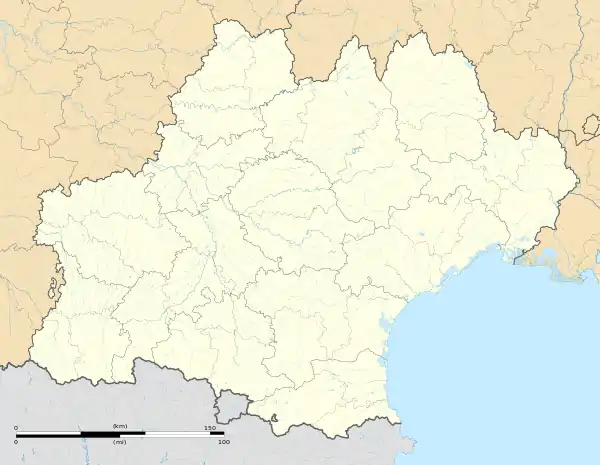Saint-Aventin
Saint-Aventin is a commune in the Haute-Garonne department in southwestern France.
Saint-Aventin | |
|---|---|
 A general view of Saint-Aventin | |
Location of Saint-Aventin 
| |
 Saint-Aventin  Saint-Aventin | |
| Coordinates: 42°48′26″N 0°32′49″E | |
| Country | France |
| Region | Occitanie |
| Department | Haute-Garonne |
| Arrondissement | Saint-Gaudens |
| Canton | Bagnères-de-Luchon |
| Government | |
| • Mayor (2008–2014) | Léon Tine |
| Area 1 | 17.4 km2 (6.7 sq mi) |
| Population (2017-01-01)[1] | 80 |
| • Density | 4.6/km2 (12/sq mi) |
| Time zone | UTC+01:00 (CET) |
| • Summer (DST) | UTC+02:00 (CEST) |
| INSEE/Postal code | 31470 /31110 |
| Elevation | 679–2,676 m (2,228–8,780 ft) (avg. 929 m or 3,048 ft) |
| 1 French Land Register data, which excludes lakes, ponds, glaciers > 1 km2 (0.386 sq mi or 247 acres) and river estuaries. | |
The commune of Saint-Aventin is located in the heart of the Pyrenees, and extends from the Larboust Valley in the north to the Spanish border in the South. The highest point is the Sacroux peek at 2,676 metres. The municipal territory hosts the Luchon-Superbagnères winter sports facilities, accessible only from Bagnères-de-Luchon by road or Cable car. The village of Saint-Aventin, is located in the Larboust Valley, 52 km south of Saint-Gaudens and 5km west of Bagnères-de-Luchon. The population density is 5.3per/km²
Population
|
| ||||||||||||||||||||||||||||||||||||||||||||||||||||||||||||||||||||||||||||||||||||||||||||||||||||||
| Source: EHESS[2] | |||||||||||||||||||||||||||||||||||||||||||||||||||||||||||||||||||||||||||||||||||||||||||||||||||||||
Land Marks
- Luchon-Superbagnères
- La chapelle de Saint-Aventin.
- La vallée du Lis (ou du Lys).
Gallery

church of Saint-Aventin. 
Deux autels au dieu Abellio encadrant le cippe funéraire d'un couple. 
Le portail de l'église. .JPG.webp)
La chapelle de Saint-Aventin. 
L'One au pont de Miey. _-_Fonds_Ancely_-_B315556101_A_MALBOS_1_012.jpg.webp)
Saint-Aventin near 1840, by Eugène de Malbos.
Saint Aventin Church
The Romanesque Church Saint-Aventin dates from the 11th or 12th centuries, has two bell towers, a porch decorated with sculptures, and capitals showing scenes of the life and martyrdom of saint Aventin.
The exterior walls have incorporated stone from previous buildings that reuse of stelae and pagan altars dedicated to Pyrenean gods, including Abellio and Aherbelst. Inside the church are monumental paintings, a baptismal font and a wrought iron altar. The Church has been classified historical monument since 1840.[3]
References
- "Populations légales 2017". INSEE. Retrieved 6 January 2020.
- town data from École des hautes études en sciences sociales.
- Monuments historiques, Consultée le 15 juin 2010.
| Wikimedia Commons has media related to Saint-Aventin. |